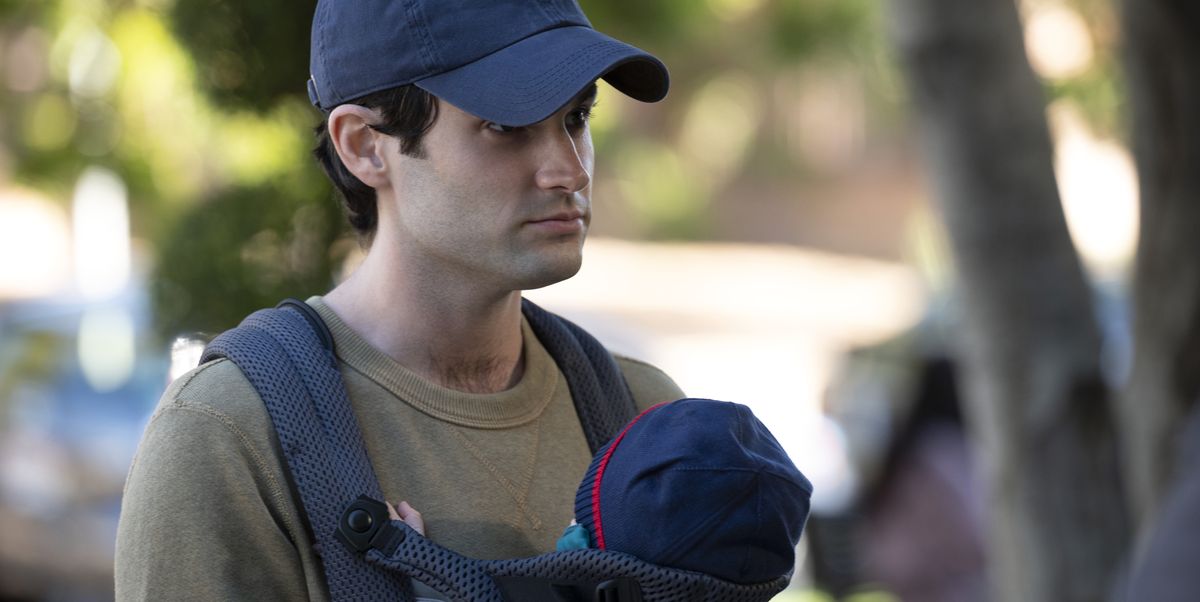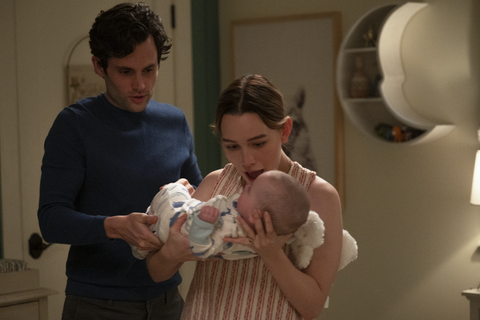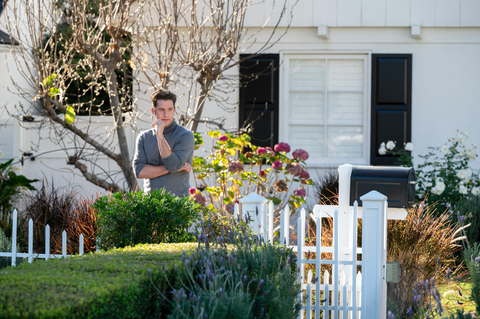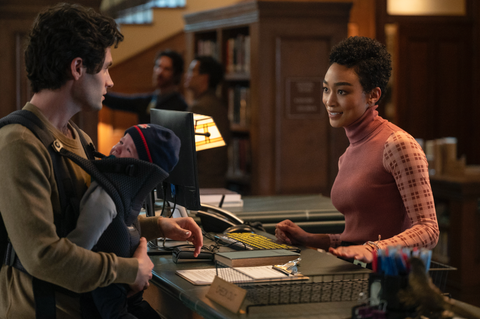This story contains spoilers for You season 3.
Not many actors have the privilege of playing two incredibly distinct, yet equally beloved (and controversial), TV characters during their career. But Penn Badgley’s move from Gossip Girl icon Dan Humphrey to You‘s resident serial killer Joe Goldberg continues to garner him the kind of praise he deserves. And with season 3 of his hit Netflix series now streaming, the actor is likely to captivate a slew of new, and returning, fans.
Since You first premiered in 2018, Badgley has been shocking and delighting viewers with his unique brand of charismatic creep, all the while dissecting dangerous romantic comedy tropes and staunchly promoting women’s rights offscreen. In this new installment, which was produced over the pandemic, Joe is weathering the challenges of marriage, fatherhood, and his new neighborhood of Madre Linda.
“I’m really curious to see how people respond, and I think I’ve already done my job,” Badgley tells ELLE.com. “I don’t really feel pressure there, but I’ve noticed that in doing a lot of these interviews that I’ve felt something new. I’m not sure what it is.” He adds later, “I’ve felt a little bit of anxiety in a way that [I] hadn’t been in a long time around this stuff.”
ELLE.com caught up with Badgley explore his journey in You‘s third season, becoming a father on the show and in real life, and what we might expect from the season 4.
In You season 3, we get to see Joe as a father. What was it like exploring his paternal side?
Well, I’m not sure about Joe’s paternal side, to be honest. I think with all emotions, he’s yearning to be authentic, but I think he, of course, never achieves it because he’s essentially a psychopath.
I certainly had the great bounty of drawing on my own experience, becoming a new biological parent, and that was quite natural. There are some definitely sweet moments where I was able to do that, but I think by and large, his paternal instinct is at best primal. I think to be a good father or a parent, you need to really rise several orders above primal, but he’s at least primal, I guess.
It feels like Joe falls in love quite a lot this season, while also being married. How did you approach him having those multiple romances?
That’s just standard textbook Joe. But I think in some ways, Joe is just a metaphor for our inner fantasy judge, whether it’s fantasizing about a lover or fantasizing about punishing someone for the way they don’t love you. That’s who Joe is. I think, actually, in some ways he always feels the same to me. It’s just a matter of applying him to different and new situations.
I liked that he got to kiss Marienne (Tati Gabrielle) under the sprinklers in episode 6. That was a very rom-com moment.
That was, I have to say, amongst one of the more constructed and sort of nerve racking and false feeling moments in all of my…In order to accomplish that, the level of technical rehearsal and all this kind of stuff, it’s just really high. It’s funny that you enjoyed it and that people may end up really enjoying that moment, but for us it was like the opposite.
It almost felt like Victoria Pedretti’s character, Love, was the antagonist this season. What was it like working closely with her, and was it difficult to portray Joe almost becoming the good guy to her villain?
Joe always thinks he’s the good guy, so, to me, it’s just this cyclical meditation on the same principles and the same themes for me playing him.
I really think it was just finding deeper, subtler layers to Victoria’s and my chemistry. It was nice. I’ve always really enjoyed working with her and been grateful for her as a co-lead because it just really demands a lot from her, from the Love character, and she delivers. She grounds stuff so beautifully.
Joe thinks he’s a good guy, but I think a lot of people are going to have empathy for him, especially this season. As a feminist, there’s always a nagging feeling in the back of my head that we’re excusing Joe, especially with flashbacks to his childhood or the idea that he’s protecting people. Does that worry you, as well?
I mean, of course. I’ve spoken a lot about it and I don’t know that I have anything new to say about it. I’ve maintained that this show and this work really, really just demands an audience. What I mean by that is sometimes you do something and you really can’t or shouldn’t think about the audience. This seems to need the audience to weigh in.
In a way, it becomes a sort of social litmus test, or something like that, or a social kind of Rorschach, because for all of our striving, for all of our awakening to the need to empower women—which is great, I couldn’t say enough about that—we still want to watch a guy like Joe. That says something, and I certainly am not the one to say exactly what that says. I think there are sociologists and brilliant women, and men, who probably could dissect that really well. I’m just fascinated to see how people respond to him.
I’m a huge Felicity fan, so I loved that Scott Speedman joined You as Joe’s neighbor, Matthew. What it was like working with him?
I had actually a really pointed experience in the third episode working with Scott because it’s a scene like many where most of my lines are an inner monologue. So as an actor on set, what I have the task of doing is sitting and really listening to him and listening to my stand-in, who reads my thoughts.
And I was laying down, curled up, having just suffered through the measles, exhausted, and lying and knowing where his wife [is]. Many layers of deceit, many layers of shame, many layers of actual physical illness, and exhaustion, and so it was like I was meant to be defeated, and listening to Scott talk about fatherhood. It was so sweet. It was just like there’s a world where it was just two men talking about the vulnerability of fatherhood. It was one of my most memorable experiences of the season, and it was a very quiet, lovely day of work.
We didn’t get a lot of that. I think it’s not always so quiet and sensitive. Actually, now that I think about it, all of my scenes with him are really that: listening, and really feeling awful, and feigning vulnerability. I don’t know, there’s a soft spot in my heart for him.
Yeah, your character is usually quite ill when you’re around him.
That’s true. I mean, at the end I’m fully paralyzed.
Have you had much input into Joe’s actions and motivations, or is that all in the script?
No, it’s all in the script. It doesn’t matter who you are as an actor; that’s really always in the script. It wouldn’t make sense a lot of times to drastically change things. It would threaten to change the story arc and all that kind of stuff. I think really what an actor does is an instrument, not a player.
I think especially television is a conversation between the writer and the audience, and they’re bringing all of their humanity to it. The actors are really just this conduit in the middle, who everybody kind of thinks of like the player, but no, we’re really the instrument. They play me and, hopefully, I’m just finely tuned to the specific things that I, as a person, am finely tuned to, and those things come out of Joe.
That’s partly why he seems so, I don’t know, sensitive, and caring, and stuff. If I always played him like a killer, it would become exhausting. You know what I mean? I’m not an actor to do that. To me, I just really focused on his tunnel vision on the concept of love, just wanting that safety.
That’s the irony of a very violent person, is they actually yearn for safety, and were denied it at some point in their lives, to the point that they became violent themselves, and think they have to be more violent to defend themselves, and save themselves from whatever. At that point, it’s an imaginary threat, it’s not real at all.
I just really focus on that, that part of him that really believes what he’s saying, because in the context of his mind that he is traumatized, his traumatized mind and nervous system, he’s right.
It feels like he’s cleaning up more messes in this season than he is creating them.
That’s true, yeah. The funny thing is that it gives him a lot more reasons to feel right. To really feel like he is a good guy being so tragically mistreated.
He really does feel like he’s the most persecuted man in all of history. And, unfortunately, he finds himself in a situation that could almost…there’s a world where that position is defended because Love is also crazy and murderous.
He found a new love interest in Marienne, who mirrored a lot more of his past. He’s found someone else who really wants that sense of family, and he seems to really think that relationship could work. Do you think that’s just all in his head, or do you think maybe he could have a nice, happy life?
Well, again, with Joe, it’s always in his head because even though that’s true—what you said is true, there’s this shared experience—but, look, at the same time he has that with Love. They clearly have a shared experience of being exposed to a level of abuse, and trauma, and violence.
Maybe in the real world it doesn’t have to be point-to-point similar people in a relationship, if they’re looking for common ground. I think this is the thing that no character in this show understands, because—I’ll save it for a few peripheral characters—everybody has such unhealthy relationships.
When you’re looking for common ground, you don’t have to literally have been through the same experience. I think the funny thing about Joe, the tragic irony, is that he shares a lot with everyone he’s been with. But at some point, that’s not enough.
At some point, it doesn’t matter. He literally is staring in the mirror with a lot of these people. He’s projecting all of his own experiences onto them. That’s where I think the allegory of Joe works because these are the powerful misconceptions that we have in relationships, which is why so many of our relationships fail. It’s like, we’re looking for something that another person cannot provide.
Joe just does that to the Nth degree. Her name could be Josephina, you know what I mean? She could have gone through every single same experience, and it does not matter. It does not matter because he’s looking for something from any partner, which is something that only he can provide himself.
And he also has that sense of entitlement that he’s going to get what he wants from each of these people, I suppose.
That’s right. So the thing that I was saying is genderless, and the other thing you’re saying is what specifically men are cultured to do, yeah. Unfortunately.
By the end of the season, Joe has fled to Paris. Are you hoping that you get to film in France, or is there somewhere else you would like to see him disappear to next?
I don’t know how much I am allowed to say. Frankly, no one knows right now. We legitimately do not know for sure where we will be shooting the fourth season. I can say at this point, there is a strong chance it’s not America.
This content is imported from Twitter. You may be able to find the same content in another format, or you may be able to find more information, at their web site.
England. Come to England.
You might get your wish.
I thought it was an interesting choice, though, to see Joe in Paris. It felt a bit Carrie Bradshaw.
Yeah, I know. Again, the show is going to come out, everybody’s going to binge it. By, what, November people are going to be like, “What’s happening in season 4?” It’s probably very important to Netflix and the crews of the show, how they want to tease that out. So I really don’t think I should say anything.
This interview has been edited and condensed for clarity.
This content is created and maintained by a third party, and imported onto this page to help users provide their email addresses. You may be able to find more information about this and similar content at piano.io



